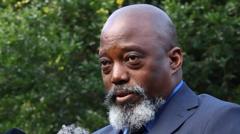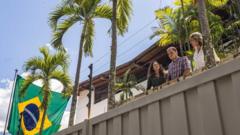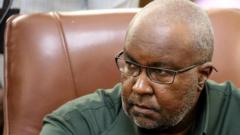The Congolese government has enacted a ban on the PPRD party linked to Joseph Kabila, fueling controversy amid ongoing conflict in the eastern regions.
Former DR Congo President's Party Banned Amid Rebel Allegations

Former DR Congo President's Party Banned Amid Rebel Allegations
Former President Joseph Kabila faces accusations of ties to M23 rebels as his political party is prohibited from operating.
The Democratic Republic of Congo has officially banned the Political Party for the Renewal of Democracy (PPRD), associated with former President Joseph Kabila, amid accusations that he maintains connections with the M23 rebel group. The M23 has made significant territorial gains in the eastern part of the country this year, following Kabila's recent return from a two-year stay in South Africa to Goma, a town that has come under M23 control.
Once a prominent leader, Kabila assumed the presidency at just 29 years old after his father, Laurent Kabila, was assassinated in 2001. A spokesperson from the interior ministry stated that the PPRD's operations would be halted due to its “ambiguous” stance on the M23's occupation of Congolese land, and suggested that Kabila's return to Goma implies cooperation with the “enemy.” The PPRD has yet to issue any statement regarding the ban.
In a dramatic escalation, the government has accused Kabila of high treason and has announced that his properties will be seized. Despite Kabila denying any affiliations with the M23 previously, he has refrained from addressing the government's latest actions against him or confirming his location. His spokesperson stated that Kabila would soon make a national address.
Kabila, who passed power to Félix Tshisekedi in January 2019 after a contentious electoral process, had been living in exile since 2023, citing the need for academic pursuits in South Africa. However, he announced shortly before his return that he sought to aid in resolving the escalating security and institutional crises in DR Congo.
Political analysts have pointed out that Kabila’s ties to various political figures, particularly Corneille Nangaa, who was once Kabila's ally and now leads the political faction comprising M23, complicate the situation. Many Congolese recall the historical precedent set by Kabila's father, Laurent, who similarly launched his political career from the eastern regions.
As tensions rise, the situation in the Democratic Republic of Congo remains fluid, with the repercussions of Kabila's actions and associations continuing to unfold in the face of a complex and ongoing conflict that has deep-rooted implications for the nation.
Once a prominent leader, Kabila assumed the presidency at just 29 years old after his father, Laurent Kabila, was assassinated in 2001. A spokesperson from the interior ministry stated that the PPRD's operations would be halted due to its “ambiguous” stance on the M23's occupation of Congolese land, and suggested that Kabila's return to Goma implies cooperation with the “enemy.” The PPRD has yet to issue any statement regarding the ban.
In a dramatic escalation, the government has accused Kabila of high treason and has announced that his properties will be seized. Despite Kabila denying any affiliations with the M23 previously, he has refrained from addressing the government's latest actions against him or confirming his location. His spokesperson stated that Kabila would soon make a national address.
Kabila, who passed power to Félix Tshisekedi in January 2019 after a contentious electoral process, had been living in exile since 2023, citing the need for academic pursuits in South Africa. However, he announced shortly before his return that he sought to aid in resolving the escalating security and institutional crises in DR Congo.
Political analysts have pointed out that Kabila’s ties to various political figures, particularly Corneille Nangaa, who was once Kabila's ally and now leads the political faction comprising M23, complicate the situation. Many Congolese recall the historical precedent set by Kabila's father, Laurent, who similarly launched his political career from the eastern regions.
As tensions rise, the situation in the Democratic Republic of Congo remains fluid, with the repercussions of Kabila's actions and associations continuing to unfold in the face of a complex and ongoing conflict that has deep-rooted implications for the nation.





















